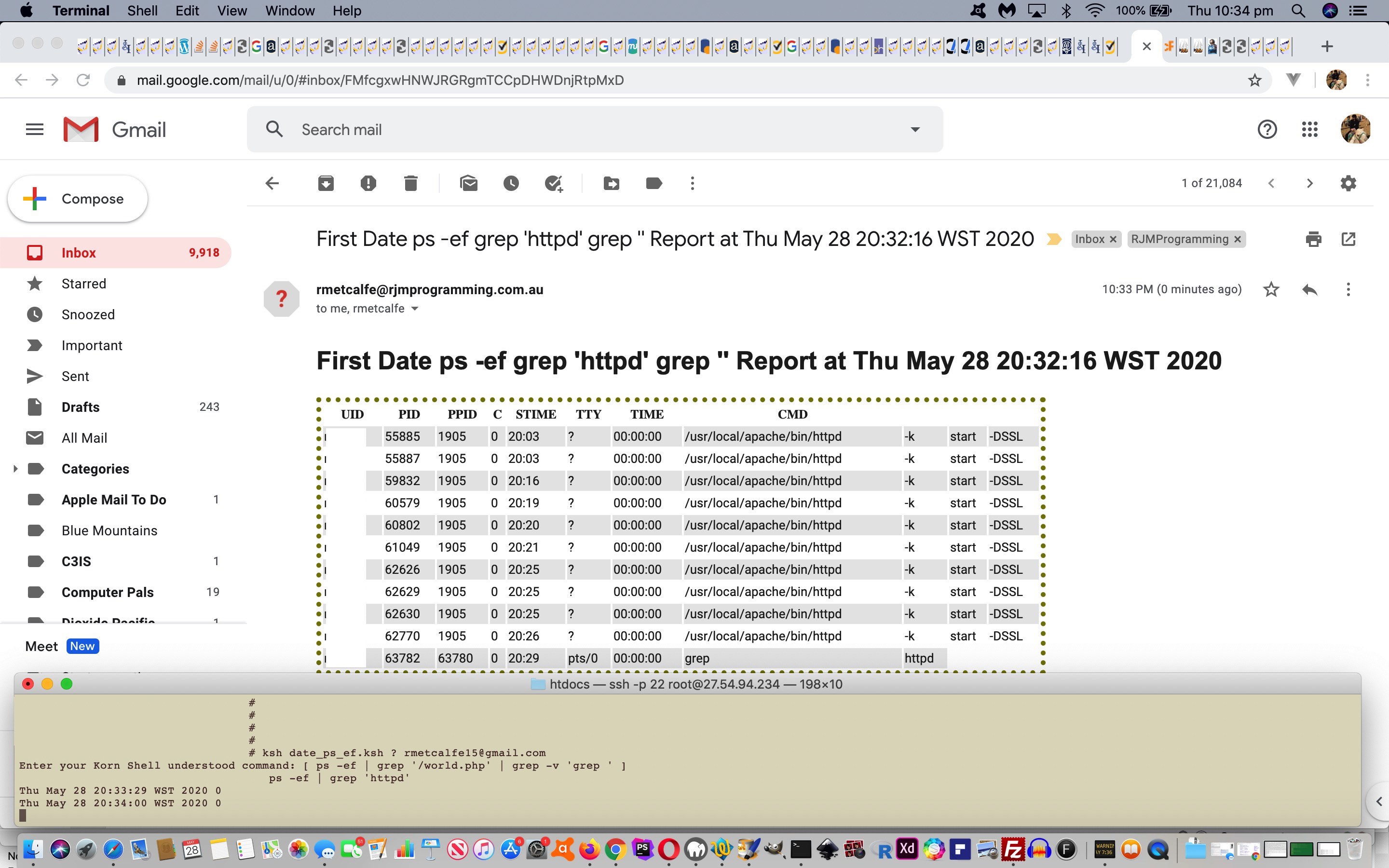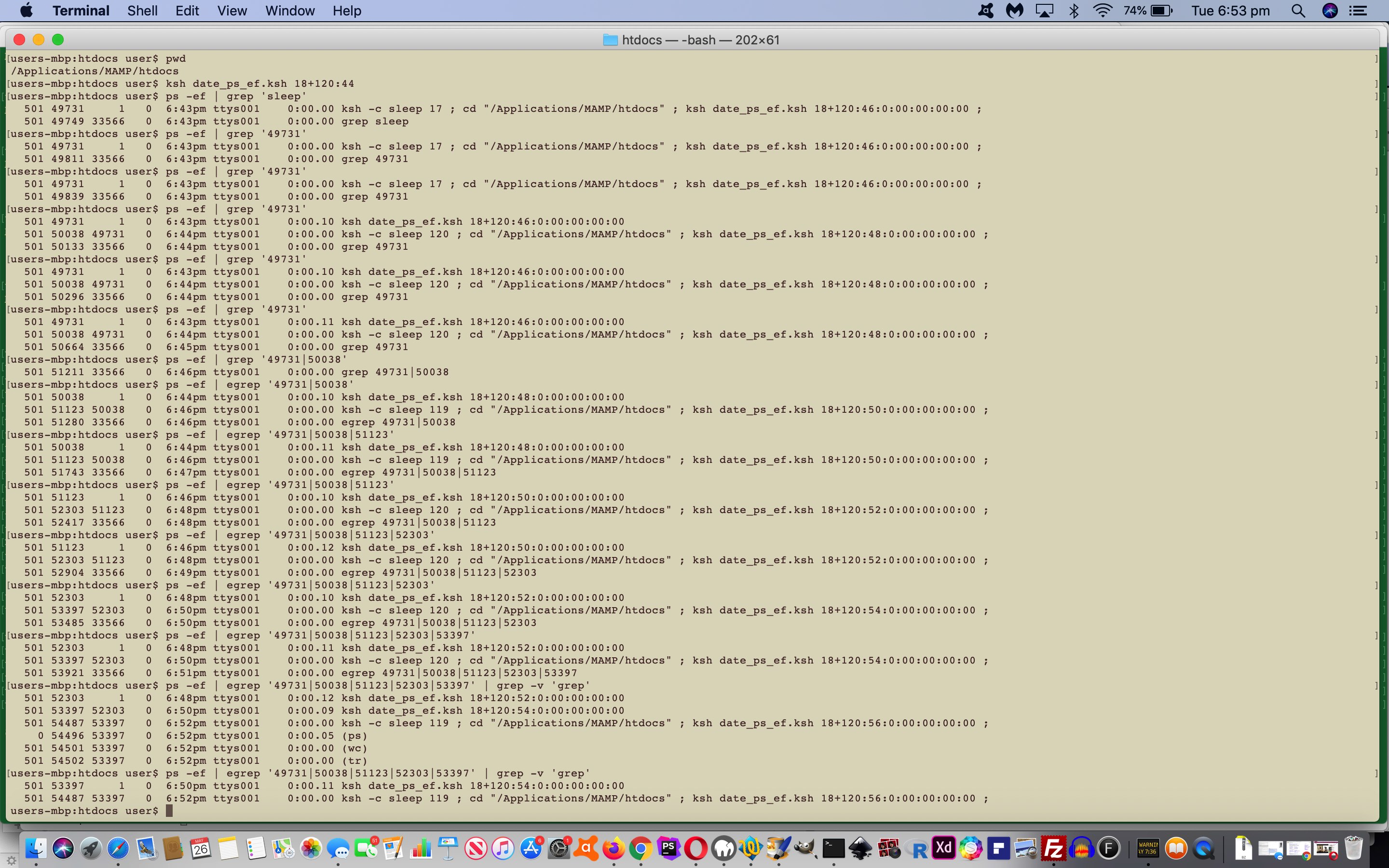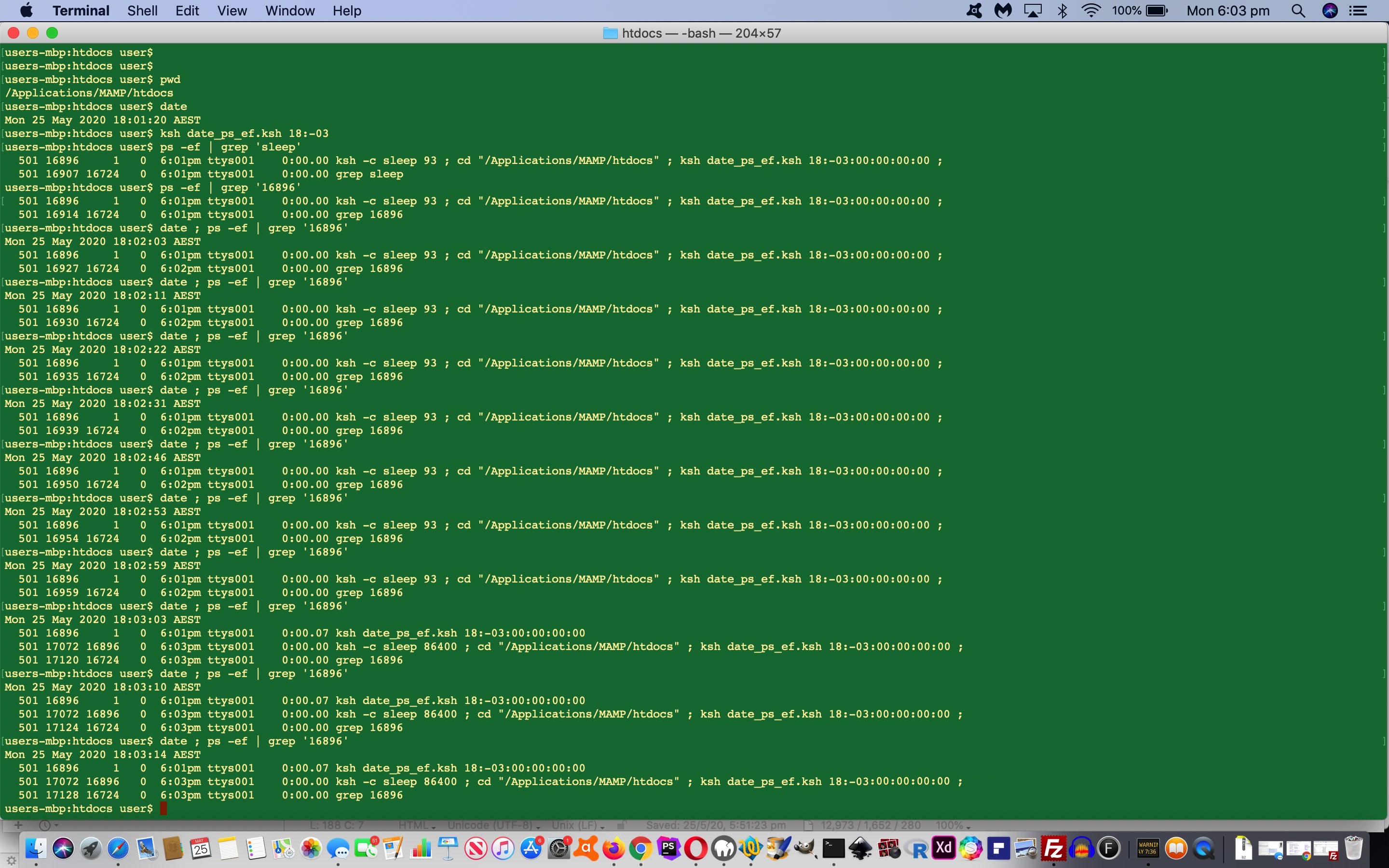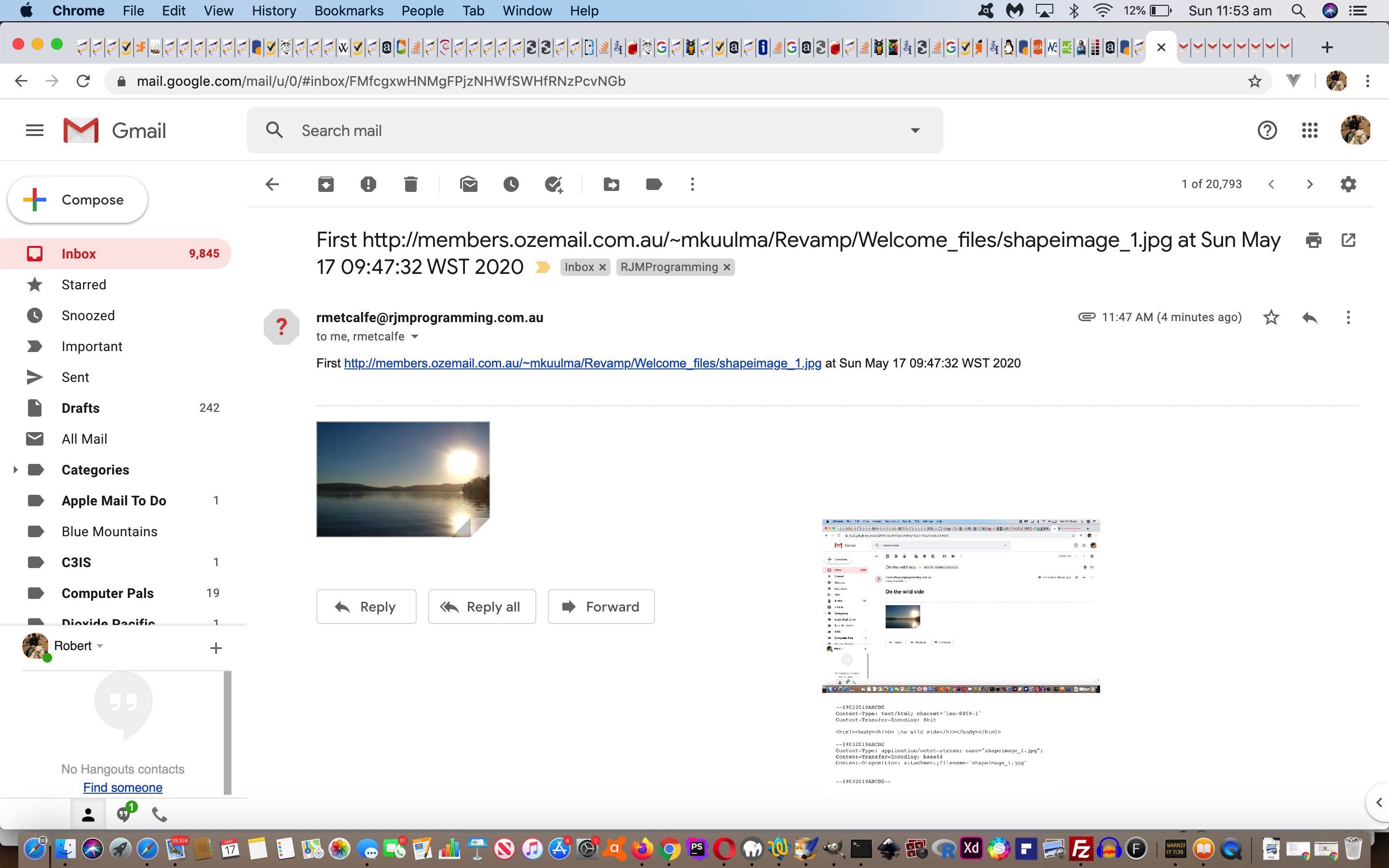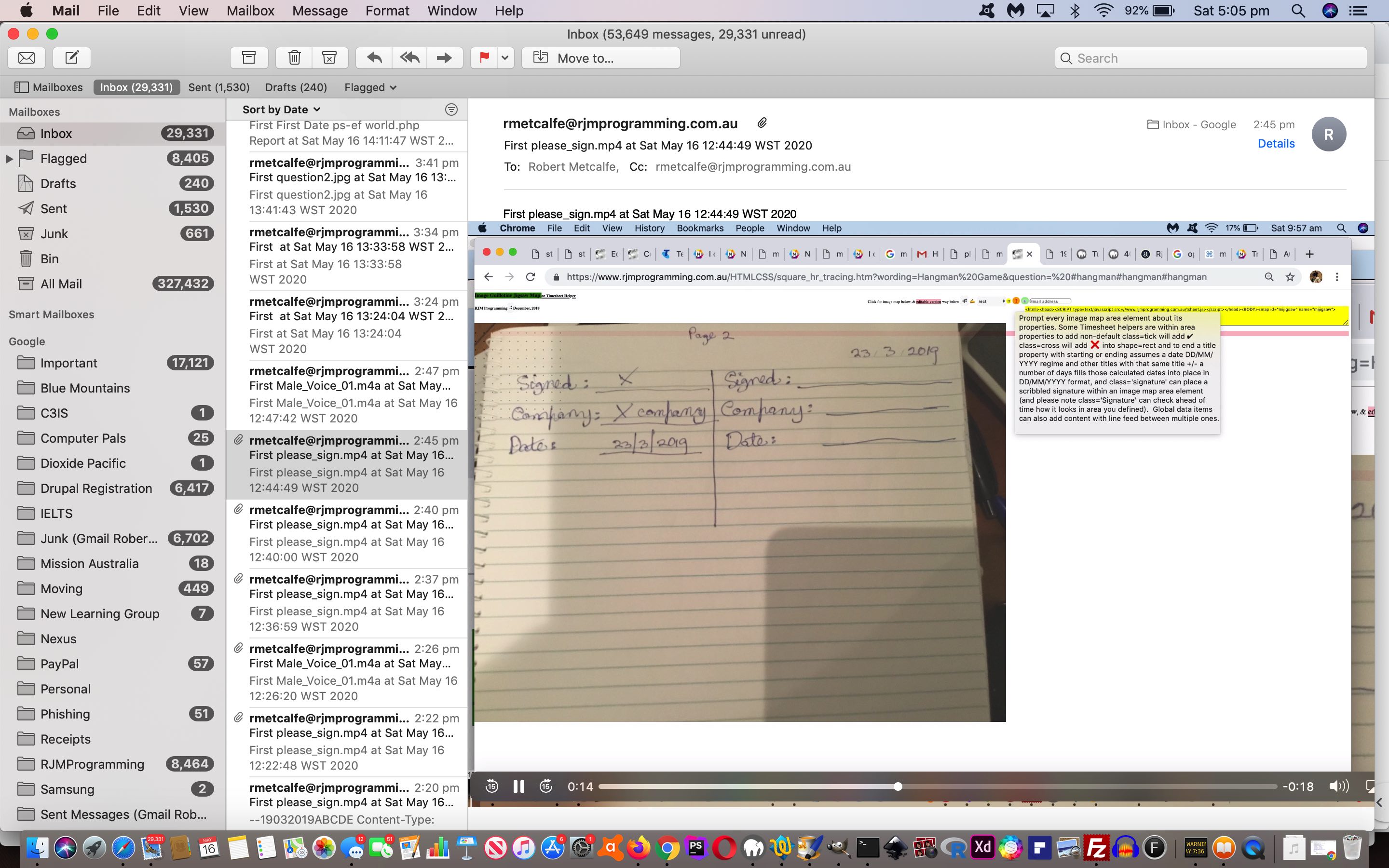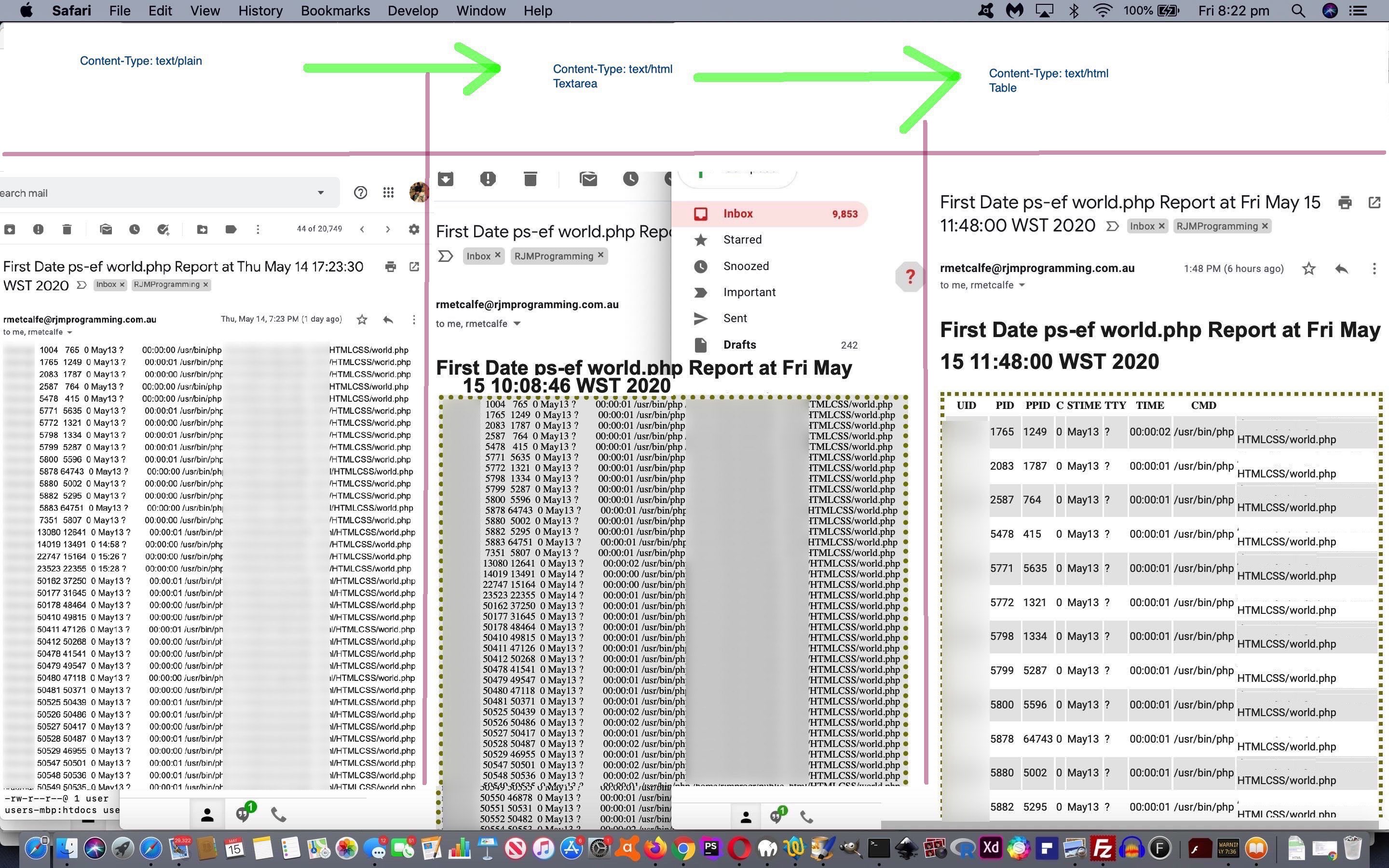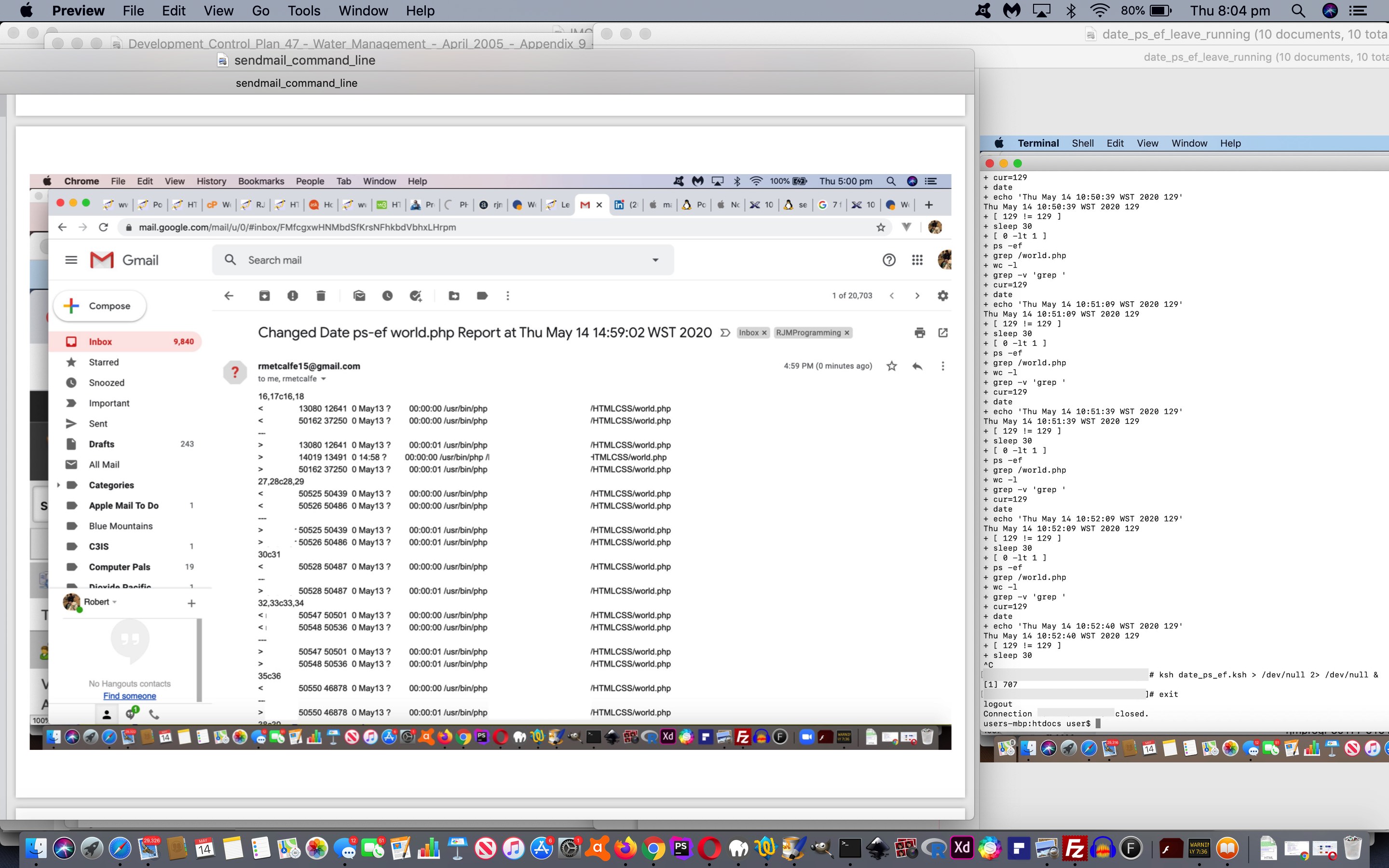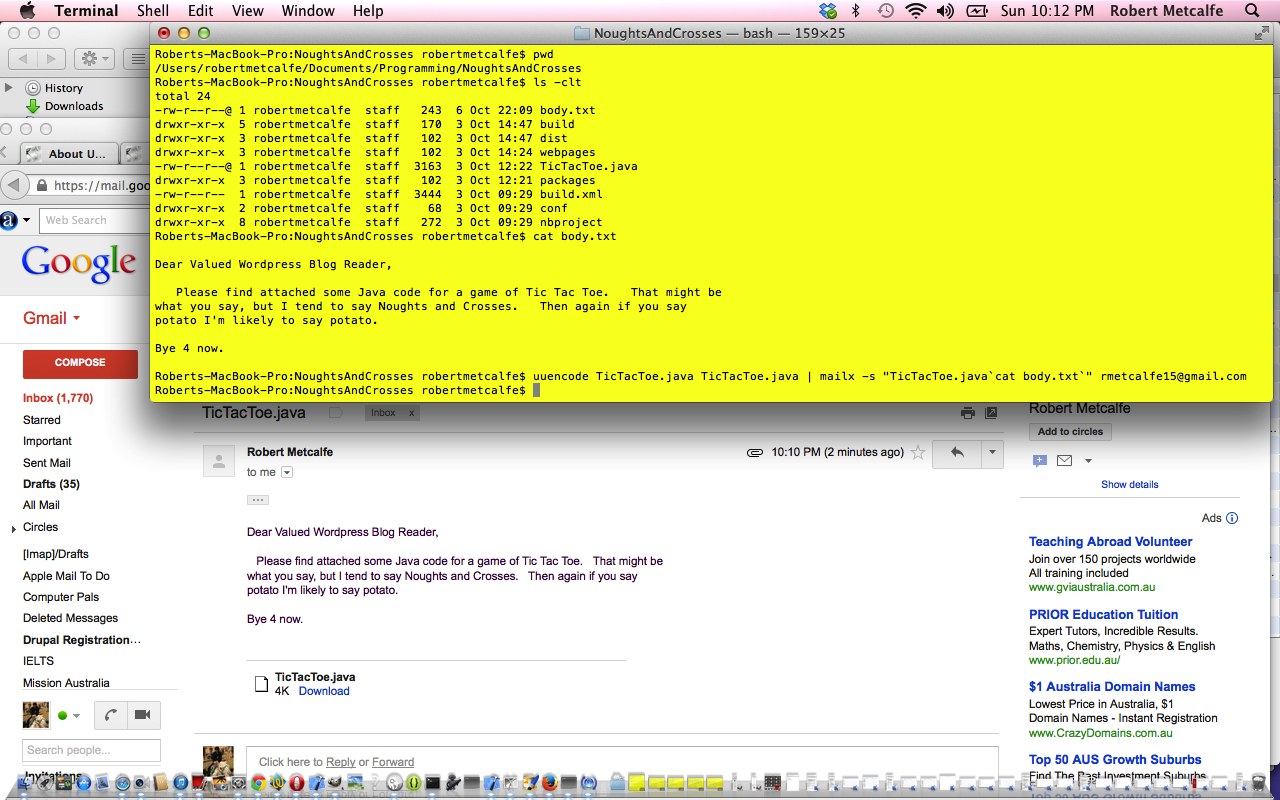It’s all fine and good adding “nohup” scheduling but what if there are not ways to schedule “what” (ie. the resultant report content) a lot of users want, adding onto the recent Linux sendmail nohup Refined Scheduling Tutorial?
Well, today, we’re turning our attention to isolating the “what” and turning it into a parameterizable concept of our Korn Shell (Linux or unix or macOS) command line script.
This “what” report content default value is …
ps -ef | grep '/world.php' | grep -v 'grep'
… but the pipe “|”s were problematic to us within the one Korn Shell variable and so we coded for three parts to a command we “|” pipe ourselves (any Clayton’s pipes can be ” | grep ” “) …
topiccmd="`echo \"ps -ef | grep '/world.php' | grep -v 'grep '\"`"
topiccmd1="`echo \"ps -ef \"`"
topiccmd2="`echo \"grep '/world.php'\"`"
topiccmd3="`echo \"grep -v 'grep '\"`"
… and establish any user defined non-default via argument “?” ( anywhere within one … eg. 10+1.5:?43 ) involvement teamed with (Korn Shell) script interactive entry, and readying command line flagging of non-default report actions, as per …
cmdsuffix=''
if [ "`echo \"${1}\" | sed '/^topiccmd/s///g'`" != "`echo \"${1}\"`" ]; then
if [ "`echo \"${1}\" | sed '/^topiccmd1=/s///g'`" != "`echo \"${1}\"`" ]; then
topiccmd1="`echo \"${1:10}\" | tr '~' ' '`"
cmdsuffix="${cmdsuffix} topiccmd1=${1:10}"
elif [ "`echo \"${1}\" | sed '/^topiccmd2=/s///g'`" != "`echo \"${1}\"`" ]; then
topiccmd2="`echo \"${1:10}\" | tr '~' ' '`"
cmdsuffix="${cmdsuffix} topiccmd2=${1:10}"
elif [ "`echo \"${1}\" | sed '/^topiccmd3=/s///g'`" != "`echo \"${1}\"`" ]; then
topiccmd3="`echo \"${1:10}\" | tr '~' ' '`"
cmdsuffix="${cmdsuffix} topiccmd3=${1:10}"
fi
elif [ "`echo \"${1}\" | sed '/\?/s///g'`" != "`echo \"${1}\"`" ]; then
topiccmd="ps -ef | grep '/world.php' | grep -v 'grep '"
topiccmd1="ps -ef"
topiccmd2="grep '/world.php'"
topiccmd3="grep -v 'grep '"
echo "Enter your Korn Shell understood command: [ ${topiccmd1} | ${topiccmd2} | ${topiccmd3} ]"
read ptopic
if [ ! -z "`echo \"${ptopic}\" | tr -d \"\\n\"`" ]; then
topiccmd2=" grep ''"
topiccmd3=" grep ''"
ptopic="`echo \"${ptopic}\" | sed \"/|/s//\\|/g\"`"
topiccmd1="`echo \"${ptopic}\" | cut -f 1 -d \"|\"`"
cmdsuffix="${cmdsuffix} topiccmd1=`echo \"${topiccmd1}\" | tr ' ' '~'`"
ptopic="${ptopic} | grep ''"
topiccmd2="`echo ${ptopic} | cut -f 2 -d \"|\"`"
cmdsuffix="${cmdsuffix} topiccmd2=`echo \"${topiccmd2}\" | tr ' ' '~'`"
ptopic="${ptopic} | grep ''"
topiccmd3="`echo ${ptopic} | cut -f 3 -d \"|\"`"
cmdsuffix="${cmdsuffix} topiccmd3=`echo \"${topiccmd3}\" | tr ' ' '~'`"
fi
fi
… so that where we once would have had echo “`ps -ef | grep ‘/world.php’ | grep -v ‘grep ‘`” > date_ps_ef_first.txt we now have …
echo "${topiccmd1} | ${topiccmd2} | ${topiccmd3}" > date_ps_ef_first_bit.ksh
ksh ./date_ps_ef_first_bit.ksh > date_ps_ef_first.txt
rm -f ./date_ps_ef_first_bit.ksh
Here is the changed date_ps_ef.ksh Korn Shell script to start down this new parameterizable “journey”. “Journey”, because there is more to do regarding “tabular” display in thought and action.
Previous relevant Linux sendmail nohup Refined Scheduling Tutorial is shown below.
Yesterday’s Linux sendmail nohup Scheduling Tutorial left us with a Linux (or unix) …
… scheduling Korn Shell script coding snippet for either …
- one off scheduled process execution … eg. date_ps_ef.ksh 10:43 … or …
- “daily” continuous (as long as the server is up) process execution … eg. date_ps_ef.ksh 10:-43
… and today we get even closer to crontab with capabilities by adding to “daily” scheduling the possibility for “other time period” (continuous processing) scheduling. For example …
- date_ps_ef.ksh 10+1.5:43 starts at the next “10:43” and then every one hour and a half
- date_ps_ef.ksh 10+40:43 starts at the next “10:43” and then every forty minutes
- date_ps_ef.ksh 10+60:43 starts at the next “10:43” and then every minute (60 seconds)
And so, the changed date_ps_ef.ksh Korn Shell script new logic parts for non-daily scheduling shows below …
if [ "`echo \"${1}\" | sed '/^0/s///g' | sed '/^1/s///g' | sed '/^2/s///g' | sed '/^3/s///g' | sed '/^4/s///g' | sed '/^5/s///g' | sed '/^6/s///g' | sed '/^7/s///g' | sed '/^8/s///g' | sed '/^9/s///g'`" != "`echo \"${1}\"" ]; then
if [ "`echo \"${1}\" | sed '/0$/s///g' | sed '/1$/s///g' | sed '/2$/s///g' | sed '/3$/s///g' | sed '/4$/s///g' | sed '/5$/s///g' | sed '/6$/s///g' | sed '/7$/s///g' | sed '/8$/s///g' | sed '/9$/s///g'`" != "`echo \"${1}\"" ]; then
if [ "`echo \"${1}\" | sed '/\:/s///g'`" != "`echo \"${1}\"" ]; then
pfrom=""
pto=""
preadddh=""
adddh=""
addh="0"
addm="0"
adds="0"
twoy=""
factor="1"
thsx="3600"
secstowait="0"
nowis="`date '+%H:%M:%S'`"
one="${1}"
oney="${1}"
his="`echo ${nowis} | cut -f 1 -d ':'`"
hfrom="`echo ${one}:00 | cut -f 1 -d ':' | cut -f 1 -d '-' | cut -f 1 -d '+' | tr -d '-'`"
mis="`echo ${nowis} | cut -f 2 -d ':'`"
mfrom="`echo ${one}:00 | cut -f 2 -d ':' | tr -d '-' | tr -d '+'`"
sis="`echo ${nowis} | cut -f 3 -d ':'`"
sfrom="`echo ${one}:00 | cut -f 3 -d ':' | tr -d '-' | tr -d '+'`"
if [ "`echo ${1} | tr -d '-'`" != "`echo ${1}`" ]; then
twoy="`echo ${1} | sed '/\:00\:00\:00\:00/s///g'`:00:00:00:00"
if [ "`echo ${1} | sed '/\:\-/s///g'`" == "`echo ${1}`" ]; then
preadddh="-"
adddh="`echo \"${one}:00\" | cut -f 2 -d '-' | cut -f 1 -d ':'`"
xadddh="`echo \"${adddh}\" | cut -f 1 -d '.'`"
if [ "`expr ${xadddh} \>= 24`" == "1" ]; then
if [ "`expr ${xadddh} \< 60`" == "1" ]; then
thsx="60"
factor="1"
else
thsx="1"
factor="1"
fi
fi
if [ "${adddh}" != "${xadddh}" ]; then
if [ "`expr ${xadddh} \>= 24`" == "1" ]; then
if [ "`expr ${xadddh} \< 60`" == "1" ]; then
thsx="60"
else
thsx="1"
fi
fi
zadddh="`echo \"${adddh}.\" | cut -f 2 -d '.'`"
zlen="`echo \"${zadddh}\" | tr -d ' ' | wc -c | tr -d ' '`"
if [ "${zlen}" == "0" -o "${thsx}" == "1" ]; then
factor="1"
elif [ "${zlen}" == "1" -o "${thsx}" == "1" ]; then
factor="1"
elif [ "${zlen}" == "2" -o "${thsx}" == "60" ]; then
factor="10"
xadddh="`echo ${xadddh}${zadddh:0:1}`"
elif [ "${zlen}" == "3" ]; then
factor="100"
xadddh="`echo ${xadddh}${zadddh:0:2}`"
else
factor="100"
xadddh="`echo ${xadddh}${zadddh:0:2}`"
fi
fi
if [ ! -z "${adddh}" ]; then
addh="`echo \"0${adddh}\" | cut -f 1 -d '.'`"
if [ "$thsx" == "1" ]; then
addh="`expr $xadddh \\/ 3600`"
elif [ "$thsx" == "60" ]; then
addh="`expr $xadddh \\/ 60`"
fi
adds="`expr ${xadddh} \\* ${thsx} \\/ ${factor}`"
adds="`echo \"${adds}\" | cut -f 1 -d '.'`"
adds="`expr ${adds} - ${addh} \\* 3600`"
addm="`expr ${adds} \\/ 60`"
addm="`echo \"${addm}\" | cut -f 1 -d '.'`"
adds="`expr ${adds} - ${addm} \\* 60`"
pfrom="${1}"
pto="${1}"
fi
fi
elif [ "`echo ${1} | tr -d '+'`" != "`echo ${1}`" ]; then
twoy="`echo ${1} | sed '/\:00\:00\:00\:00/s///g'`:00:00:00:00"
if [ "`echo ${1} | sed '/\:\+/s///g'`" == "`echo ${1}`" ]; then
preadddh="+"
adddh="`echo \"${one}:00\" | cut -f 2 -d '+' | cut -f 1 -d ':'`"
xadddh="`echo \"${adddh}\" | cut -f 1 -d '.'`"
if [ "`expr ${xadddh} \>= 24`" == "1" ]; then
if [ "`expr ${xadddh} \< 60`" == "1" ]; then
thsx="60"
factor="1"
else
thsx="1"
factor="1"
fi
fi
if [ "${adddh}" != "${xadddh}" ]; then
if [ "`expr ${xadddh} \>= 24`" == "1" ]; then
if [ "`expr ${xadddh} \< 60`" == "1" ]; then
thsx="60"
else
thsx="1"
fi
fi
zadddh="`echo \"${adddh}.\" | cut -f 2 -d '.'`"
zlen="`echo \"${zadddh}\" | tr -d ' ' | wc -c | tr -d ' '`"
if [ "${zlen}" == "0" -o "${thsx}" == "1" ]; then
factor="1"
elif [ "${zlen}" == "1" -o "${thsx}" == "1" ]; then
factor="1"
elif [ "${zlen}" == "2" -o "${thsx}" == "60" ]; then
factor="10"
xadddh="`echo ${xadddh}${zadddh:0:1}`"
elif [ "${zlen}" == "3" ]; then
factor="100"
xadddh="`echo ${xadddh}${zadddh:0:2}`"
else
factor="100"
xadddh="`echo ${xadddh}${zadddh:0:2}`"
fi
fi
if [ ! -z "${adddh}" ]; then
addh="`echo \"0${adddh}\" | cut -f 1 -d '.'`"
if [ "$thsx" == "1" ]; then
addh="`expr $xadddh \\/ 3600`"
elif [ "$thsx" == "60" ]; then
addh="`expr $xadddh \\/ 60`"
fi
adds="`expr ${xadddh} \\* ${thsx} \\/ ${factor}`"
adds="`echo \"${adds}\" | cut -f 1 -d '.'`"
adds="`expr ${adds} - ${addh} \\* 3600`"
addm="`expr ${adds} \\/ 60`"
addm="`echo \"${addm}\" | cut -f 1 -d '.'`"
adds="`expr ${adds} - ${addm} \\* 60`"
pfrom="${1}"
pto="${1}"
fi
fi
fi
if [ ! -z "${preTZ}" -o ! -z "${adddh}" ]; then
bnowis="`date '+%H:%M'`"
if [ -z "${preTZ}" ]; then
ccnowis="`date '+%H:%M:%S'`"
cnowis="`date '+%H:%M'`"
else
ccnowis="`TZ=${preTZ} date '+%H:%M:%S'`"
cnowis="`TZ=${preTZ} date '+%H:%M'`"
fi
if [ "`echo ${nowis} | sed '/${cnowis}/s///g'`" == "`echo ${nowis}`" -o ! -z "${adddh}" ]; then
chis="`echo ${cnowis}:00 | cut -f 1 -d ':'`"
cmis="`echo ${cnowis}:00 | cut -f 2 -d ':'`"
csis="`echo ${ccnowis}:00 | cut -f 3 -d ':'`"
if [ ! -z "${adddh}" ]; then
news="`expr ${sfrom} + ${adds}`"
if [ "`expr ${news} \< 60`" == "1" ]; then
newm="`expr ${mfrom} + ${addm}`"
else
news="`expr ${news} - 60`"
newm="`expr ${mfrom} + ${addm} + 1`"
fi
if [ "`expr ${newm} \< 60`" == "1" ]; then
newh="`expr ${hfrom} + ${addh}`"
else
newm="`expr ${newm} - 60`"
newh="`expr ${hfrom} + ${addh} + 1`"
fi
if [ "`expr ${newh} \>= 24`" == "1" ]; then
newh="`expr ${newh} - 24`"
fi
pto="${newh}${preadddh}${adddh}:${newm}:${news}"
fi
#one="`expr ${chis} - ${his} + ${hfrom} + ${addh}`:`expr ${cmis} - ${mis} + ${mfrom} + ${addm}`:`expr ${csis} - ${sis} + ${sfrom} + ${adds}`"
one="`expr ${chis} - ${his} + ${hfrom}`:`expr ${cmis} - ${mis} + ${mfrom}`:`expr ${csis} - ${sis} + ${sfrom}`"
hfrom="`echo ${one}:00 | cut -f 1 -d ':' | cut -f 1 -d '-' | cut -f 1 -d '+' | tr -d '-'`"
mfrom="`echo ${one}:00 | cut -f 2 -d ':' | cut -f 1 -d '-' | cut -f 1 -d '+' | tr -d '-'`"
sfrom="`echo ${one}:00 | cut -f 3 -d ':' | cut -f 1 -d '-' | cut -f 1 -d '+' | tr -d '-'`"
his="`echo ${cnowis}:00 | cut -f 1 -d ':'`"
mis="`echo ${cnowis}:00 | cut -f 2 -d ':'`"
sis="`echo ${ccnowis}:00 | cut -f 3 -d ':'`"
nowis="${ccnowis}"
fi
else
bnowis="`date '+%H:%M'`"
cnowis="`date '+%H:%M'`"
fi
if [ "`expr ${hfrom} - ${his} \<= 0`" == "1" ]; then
#echo "Time found ${one} versus ${nowis} ... `expr ${hfrom} - ${his}`"
if [ "`expr ${hfrom} - ${his} \< 0`" == "1" ]; then
hfrom="`expr ${hfrom} + 24`"
else
if [ "`expr ${mfrom} - ${mis} \<= 0`" == "1" ]; then
if [ "`expr ${mfrom} - ${mis} \< 0`" == "1" ]; then
hfrom="`expr ${hfrom} + 24`"
else
if [ "`expr ${sfrom} - ${sis} \<= 0`" == "1" ]; then
if [ "`expr ${sfrom} - ${sis} \< 0`" == "1" ]; then
hfrom="`expr ${hfrom} + 24`"
fi
fi
fi
fi
fi
fi
curpid="$$"
precmdline="`ps -p ${curpid} -o args | sed '/^ARGS/s///g' | sed '/^ksh /s///g' | tr -d \"\n\"`"
if [ -z "${twoy}" ]; then
cmdline=`echo ${precmdline} | awk -v FS="${1}" '{ print $1 $2; }'`
else
rtd="`echo ${1} | sed '/\:00\:00\:00\:00/s///g'`"
cmdline="`echo ${precmdline} | awk -v FS="${rtd}" '{ print $1 FS \":00:00:00:00\" $2; }'`"
cmdline="`echo ${cmdline} | sed \"/${1}:00:00:00:00${1}:00:00:00:00/s//${1}:00:00:00:00/g\" | sed \"/${1}${1}/s//${1}/g\"`"
fi
cmdline="`echo ${cmdline} | sed '/\:00\:00\:00\:00\:00\:00\:00\:00/s//\:00\:00\:00\:00/g'`"
if [ ! -z "${pfrom}" -a ! -z "${pto}" ]; then
if [ ! -z "${pto}" -a "`echo \"${cmdline}\" | sed '/\:00\:00\:00\:00\:00\:00\:00\:00/s///g'`" == "`echo \"${cmdline}\"`" ]; then
cmdline="`echo ${cmdline} | sed \"/${pfrom}/s//${pto}:00:00:00:00/g\"`"
else
cmdline="`echo ${cmdline} | sed \"/${pfrom}/s//${pto}/g\"`"
fi
fi
secstowait="`expr ${hfrom} - ${his}`"
secstowait="`expr ${secstowait} \\* 3600`"
stowait="`expr ${mfrom} - ${mis}`"
stowait="`expr ${stowait} \\* 60`"
secstowait="`expr ${stowait} + ${secstowait}`"
stowait="`expr ${sfrom} - ${sis}`"
secstowait="`expr ${stowait} + ${secstowait}`"
if [ ! -z "${twoy}" ]; then
secstowait="`expr 1 + ${secstowait}`"
fi
cmdline="`echo ${cmdline} | sed '/\:00\:00\:00\:00\:00\:00\:00\:00/s//\:00\:00\:00\:00/g'`"
#echo "TIME found ${1} versus ${nowis} ... `expr ${hfrom} - ${his}` ... ${secstowait} ... ${cmdline} ... ${nowis} ... ${cnowis} ... sleep ${secstowait}; `echo ${cmdline}` nohup ksh -c \"sleep ${secstowait} ; cd \\\"`pwd`\\\" ; `echo ${cmdline}` ;\" > /dev/null 2> /dev/null"
nohup ksh -c "sleep ${secstowait} ; cd \"`pwd`\" ; ksh `echo ${cmdline}` ;" > /dev/null 2>> /dev/null &
if [ "`echo ${1} | sed '/\:00\:00\:00\:00/s///g'`" == "`echo ${1}`" ]; then
exit
fi
else
ppid="${1}"
#if [ "`ps -ef | grep ' ${1} ' | grep -v 'grep'`" ]; then
# exit
#fi
fi
fi
fi
Previous relevant Linux sendmail nohup Scheduling Tutorial is shown below.
As far as Linux or unix operating systems (for web servers) go for “scheduling processes”, it is …
- great if you have access to crontab because it can be …
- scheduled to the minute
- the actions can be repeated (and scheduled) in a hugely different number of ways
- starts up again on a reboot of the (web) server (in a normal arrangement)
- but less formalized can be a simple (Korn (in our case)) shell scripting procedure that involves …
… the latter representing an idea you have for either (eg. timed for 10:43) …
- a one off scheduled procedure … eg. date_ps_ef.ksh 10:43 … for next 10:43 (local time if locally executed (as we tested here on MAMP, and mapped times via informing the script of the timezone of the destination web server as per …
# Local time the Korn Shell will be hosted at
preTZ="Australia/Perth"
thispid="`echo $$`"
postiftwoquit="`ps -ef | grep \" ${thispid} \" | grep -c ':00:00:00:00'`"
iftwoquit="1"
… or web server time) … or … - a daily scheduled procedure … eg. date_ps_ef.ksh 10:-43
… via …
if [ "`echo \"${1}\" | sed '/^0/s///g' | sed '/^1/s///g' | sed '/^2/s///g' | sed '/^3/s///g' | sed '/^4/s///g' | sed '/^5/s///g' | sed '/^6/s///g' | sed '/^7/s///g' | sed '/^8/s///g' | sed '/^9/s///g'`" != "`echo \"${1}\"" ]; then
if [ "`echo \"${1}\" | sed '/0$/s///g' | sed '/1$/s///g' | sed '/2$/s///g' | sed '/3$/s///g' | sed '/4$/s///g' | sed '/5$/s///g' | sed '/6$/s///g' | sed '/7$/s///g' | sed '/8$/s///g' | sed '/9$/s///g'`" != "`echo \"${1}\"" ]; then
if [ "`echo \"${1}\" | sed '/\:/s///g'`" != "`echo \"${1}\"" ]; then
twoy=""
secstowait="0"
nowis="`date '+%H:%M:%S'`"
one="${1}"
oney="${1}"
if [ "`echo ${1} | tr -d '-'`" != "`echo ${1}`" ]; then
twoy="`echo ${1} | sed '/\:00\:00\:00\:00/s///g'`:00:00:00:00"
fi
his="`echo ${nowis} | cut -f 1 -d ':'`"
hfrom="`echo ${one}:00 | cut -f 1 -d ':' | tr -d '-'`"
mis="`echo ${nowis} | cut -f 2 -d ':'`"
mfrom="`echo ${one}:00 | cut -f 2 -d ':' | tr -d '-'`"
sis="`echo ${nowis} | cut -f 3 -d ':'`"
sfrom="`echo ${one}:00 | cut -f 3 -d ':' | tr -d '-'`"
if [ ! -z "${preTZ}" ]; then
bnowis="`date '+%H:%M'`"
ccnowis="`TZ=${preTZ} date '+%H:%M:%S'`"
cnowis="`TZ=${preTZ} date '+%H:%M'`"
if [ "`echo ${nowis} | sed '/${cnowis}/s///g'`" == "`echo ${nowis}`" ]; then
chis="`echo ${cnowis}:00 | cut -f 1 -d ':'`"
cmis="`echo ${cnowis}:00 | cut -f 2 -d ':'`"
csis="`echo ${ccnowis}:00 | cut -f 3 -d ':'`"
one="`expr ${chis} - ${his} + ${hfrom}`:`expr ${cmis} - ${mis} + ${mfrom}`:`expr ${csis} - ${sis} + ${sfrom}`"
hfrom="`echo ${one}:00 | cut -f 1 -d ':' | tr -d '-'`"
mfrom="`echo ${one}:00 | cut -f 2 -d ':' | tr -d '-'`"
sfrom="`echo ${one}:00 | cut -f 3 -d ':' | tr -d '-'`"
his="`echo ${cnowis}:00 | cut -f 1 -d ':'`"
mis="`echo ${cnowis}:00 | cut -f 2 -d ':'`"
sis="`echo ${ccnowis}:00 | cut -f 3 -d ':'`"
nowis="${ccnowis}"
fi
else
bnowis="`date '+%H:%M'`"
cnowis="`date '+%H:%M'`"
fi
if [ "`expr ${hfrom} - ${his} \<= 0`" == "1" ]; then
#echo "Time found ${one} versus ${nowis} ... `expr ${hfrom} - ${his}`"
if [ "`expr ${hfrom} - ${his} \< 0`" == "1" ]; then
hfrom="`expr ${hfrom} + 24`"
else
if [ "`expr ${mfrom} - ${mis} \<= 0`" == "1" ]; then
if [ "`expr ${mfrom} - ${mis} \< 0`" == "1" ]; then
hfrom="`expr ${hfrom} + 24`"
else
if [ "`expr ${sfrom} - ${sis} \<= 0`" == "1" ]; then
if [ "`expr ${sfrom} - ${sis} \< 0`" == "1" ]; then
hfrom="`expr ${hfrom} + 24`"
fi
fi
fi
fi
fi
fi
curpid="$$"
precmdline="`ps -p ${curpid} -o args | sed '/^ARGS/s///g' | sed '/^ksh /s///g' | tr -d \"\n\"`"
if [ -z "${twoy}" ]; then
cmdline=`echo ${precmdline} | awk -v FS="${1}" '{ print $1 $2; }'`
else
rtd="`echo ${1} | sed '/\:00\:00\:00\:00/s///g'`"
cmdline="`echo ${precmdline} | awk -v FS="${rtd}" '{ print $1 FS \":00:00:00:00\" $2; }'`"
fi
cmdline="`echo ${cmdline} | sed '/\:00\:00\:00\:00\:00\:00\:00\:00/s//\:00\:00\:00\:00/g'`"
secstowait="`expr ${hfrom} - ${his}`"
secstowait="`expr ${secstowait} \\* 3600`"
stowait="`expr ${mfrom} - ${mis}`"
stowait="`expr ${stowait} \\* 60`"
secstowait="`expr ${stowait} + ${secstowait}`"
stowait="`expr ${sfrom} - ${sis}`"
secstowait="`expr ${stowait} + ${secstowait}`"
if [ ! -z "${twoy}" ]; then
secstowait="`expr 1 + ${secstowait}`"
fi
#echo "TIME found ${1} versus ${nowis} ... `expr ${hfrom} - ${his}` ... ${secstowait} ... ${cmdline} ... ${nowis} ... ${cnowis} ... sleep ${secstowait}; `echo ${cmdline}` nohup ksh -c \"sleep ${secstowait} ; cd \\\"`pwd`\\\" ; `echo ${cmdline}` ;\" > /dev/null 2> /dev/null"
nohup ksh -c "sleep ${secstowait} ; cd \"`pwd`\" ; ksh `echo ${cmdline}` ;" > /dev/null 2>> /dev/null &
if [ "`echo ${1} | sed '/\:00\:00\:00\:00/s///g'`" == "`echo ${1}`" ]; then
exit
fi
else
ppid="${1}"
#if [ "`ps -ef | grep ' ${1} ' | grep -v 'grep'`" ]; then
# exit
#fi
fi
fi
fi
… adding that “scheduling layer” capability on top of the progress of Linux sendmail Remote Attachment Tutorial below.
In effect, the changed date_ps_ef.ksh Korn Shell script, on the user defining …
- an argument of the “hh:mm” form (or “hh:-mm” daily repeated form) will …
- calculate the number of seconds (eg. ${secstowait} below) until “hh:mm” next happens …
-
nohup ksh -c "sleep ${secstowait} ; cd \"`pwd`\" ; ksh `echo ${cmdline}` ;" > /dev/null 2>> /dev/null &
… that …
if [ ! -z "${twoy}" ]; then
secstowait="`expr 1 + ${secstowait}`"
fi
… conditionally causing the one second overshoot on date_ps_ef.ksh 10:-43 daily scheduling that will ensure a huge (around about 86400 (seconds in a day) ${secstowait}) “sleep” before the next call … - and in the case of one of those date_ps_ef.ksh 10:-43 daily scheduling calls parents will exit when a child starts running for real
… being a methodology getting towards the crontab ideal (but will not resurrect itself on a system reboot, unless you script for it), and you can get the gist of by examining today’s tutorial picture of a Korn Shell via nohup scheduling execution.
Previous relevant Linux sendmail Remote Attachment Tutorial is shown below.
Programming’s full of shells of functionality. And the way you may approach adding functionality to desktop (command line) applications such as the Korn Shell Script one featuring in yesterday’s Linux sendmail Mime Type Attachment Tutorial could go a bit like …
- we’ve written logic for the attachment of local media files attached to emails and sent off via Linux sendmail …
so why not today write functionality to cater for remote media file/URLs (where allowed, that is … via …
filen="`echo \"${1}\" | sed '/^https:/s//http:/g' | sed '/^HTTPS:/s//http:/g' | sed '/^Https:/s//http:/g'"
cfilen="`curl ${filen}`"
basechars="`echo -n \"${cfilen}\" | base64 | tr -d \"\\n\"`"
) - in the “body” section part of the email above the attachment we’ve written functionality for Content-Type: text/plain …
so why not today write functionality to cater for Content-Type: text/html here (if allowed … spoiler alert … yes, it is … we tried some, and it worked, and we do this when a user defines their own tailored email subject, as talked about below) - we’ve written functionality for a single file execution via a single relevant command line argument …
so why not today write functionality to cater for multiple file executions via a wildcard file specification … for example …
ksh date_ps_ef.ksh Mac/SQLite*.jpg > /dev/null 2> /dev/null &
… or to use a larger (ie. via HTML h1 element) on the body section text on top of the attachment …
ksh date_ps_ef.ksh "A List of Images ... [file]" Mac/SQLite*.jpg > /dev/null 2> /dev/null &
… or space delimited list of files command line argument (if allowed … spoiler alert … yes, we can do that) - we’ve written functionality for email subjects to a pattern with prefix First or Changed and suffix at [datetimestamp] …
so why not today write functionality to cater for user defined subject content here (if user uses a double quote delimited argument with one space or more, and substitutional for the token strings [date] or [file])
Hopefully that sounds interesting, and promising to you too, in which case you might want to examine the changed date_ps_ef.ksh Korn Shell script by downloading it and implementing it yourself, perhaps.
Previous relevant Linux sendmail Mime Type Attachment Tutorial is shown below.
Yesterday’s Linux sendmail Content Type Tutorial had us …
- following up (the Primer tutorial) sending of Content-Type: text/plain emails via sendmail on Linux … by …
- allowing for Inline HTML Email (report) sending of Content-Type: text/html emails via sendmail on Linux … but …
- there are more Mime Types than just these two, but we can make email attachments out of other Mime Type data forms (often regarding “image”, “video” and “audio” media Mime Types)
… and, of course, this opens up this command line Korn Shell scripting to so much more about what the Internet is about “sharing media files” (often created on mobile devices by the users themselves). This ability makes users “uploaders” of content, as so many more of us are becoming every day.
We have a favoured approach to interpretive software (though the same approach works well with non-interpretive coding too) language (the types that do not need compiling) development where a project …
- starts as a guinea pig exercise to solve a specific set of criteria (remember “Checking on /world.php ps -ef Reporting”?) … and we …
- genericize by “parameterizing” the “hardcoded words” in the code … for example, the color coded “hardcodings” of yesterday’s Linux sendmail Content Type Tutorial “First Report” email creation …
echo -e "Content-Type: text/html\nFrom: rmetcalfe@rjmprogramming.com.au\nto: rmetcalfe15@gmail.com\ncc: rmetcalfe@rjmprogramming.com.au\nSubject: First Date ps-ef world.php Report at `date`\n\n<html><head><style> tr:nth-child(even) {background-color: #CCC !important;} tr:nth-child(odd) {background-color: #FFF !important;} </style></head><body><h1>First Date ps-ef world.php Report at `date`</h1><table style='border:5px dotted olive;width:70%;height:100%;margin: 5 5 5 5;font-family:Courier-New;'><tr><th>UID</th><th>PID</th><th>PPID</th><th>C</th><th>STIME</th><th>TTY</th><th>TIME</th><th>CMD</th></tr>`cat date_ps_ef_first.txt | sed '/^/s//<tr><td>/g' | sed 's/ \{1,\}/<\/td><td>/g' | awk '{ t=0; while (getline \$0) { if (t == 0) { print \"<tr style=background-color:#e7e7e7 !important;\" substr(\$0,3); } else { print \$0; } t=1-t; } }' | sed '/$/s//<\/td><\/tr>/g'`</table></body></html>" | sendmail -t -f rmetcalfe15@gmail.com
… becomes …
echo -e "${mimetype}From: ${emailfrom}\nTo: ${emailto}\nCC: ${emailcc}\n${emailbcc}Subject: First ${subjmiddle} at `date`\n${attachrest}" | sendmail -t -f ${emailto}
… via … - command line argument logic (ie. parameterization) helping derive those Korn Shell Script “$” variable value determination …
#!/bin/ksh
mimetype="Content-Type: text/html\\n"
emailfrom="rmetcalfe@rjmprogramming.com.au"
emailto="rmetcalfe15@gmail.com"
emailcc="rmetcalfe@rjmprogramming.com.au"
emailbcc=""
subjmiddle="Date ps-ef world.php Report"
lastcur=""
filen=""
attachrest="\\n<html><head><style> tr:nth-child(even) {background-color: #CCC !important;} tr:nth-child(odd) {background-color: #FFF !important;} </style></head><body><h1>First First ${subjmiddle} at `date`</h1><table style='border:5px dotted olive;width:70%;height:100%;margin: 5 5 5 5;font-family:Courier-New;'><tr><th>UID</th><th>PID</th><th>PPID</th><th>C</th><th>STIME</th><th>TTY</th><th>TIME</th><th>CMD</th></tr>`cat date_ps_ef_first.txt | sed '/^/s//<tr><td>/g' | sed 's/ \{1,\}/<\/td><td>/g' | awk '{ t=0; while (getline \$0) { if (t == 0) { print \"<tr style=background-color:#e7e7e7 !important;\" substr(\$0,3); } else { print \$0; } t=1-t; } }' | sed '/$/s//<\/td><\/tr>/g'`</table></body></html>"
if [ ! -z "$1" ]; then
while [ ! -z "$1" ]; do
if [ "`echo \"${1}\" | tr -d '@'`" != "`echo \"${1}\"" ]; then
if [ "`echo \"${emailto}\" | tr -d ' '`" == "`echo \"${emailto}\"" ]; then
emailto="${1} "
elif [ "`echo \"${emailcc}\" | tr -d ' '`" == "`echo \"${emailcc}\"" ]; then
emailcc="${1} "
else
emailbcc="BCC: ${1}\\n"
fi
elif [ -f "${1}" ]; then
if [ ! -z "${mimetype}" ]; then
filen="${1}"
mimetype=""
shortf=""
basechars="`base64 ${filen} | tr -d \"\\n\"`"
i=0
flast="`echo ${1} | tr '/' ' ' | sed '/\\\\/s// /g'`"
for filebits in ${flast}; do
shortf=$filebits
((i=i+1))
done
subjmiddle="$shortf"
attachrest="Mime-Version: 1.0\\nContent-Type: multipart/mixed; boundary=\"19032019ABCDE\"\\n\\n--19032019ABCDE\\nContent-Type: text/plain; charset=\"iso-8859-1\"\\nContent-Transfer-Encoding: 8bit\\n\\nFirst ${subjmiddle} at `date`\\n\\n--19032019ABCDE\\nContent-Type: application/octet-stream; name=\"${shortf}\";\\nContent-Transfer-Encoding: base64\\nContent-Disposition: attachment;filename=\"${shortf}\"\\n\\n${basechars}\\n--19032019ABCDE--"
fi
fi
shift
done
emailfrom="`echo ${emailfrom} | tr -d ' '`"
emailto="`echo ${emailto} | tr -d ' '`"
emailcc="`echo ${emailcc} | tr -d ' '`"
fi
… the main extra argument can point at a rjmprogramming.com.au domain web server file
… leaving …
ksh date_ps_ef.ksh > /dev/null 2> /dev/null &
… unchanged as a rjmprogramming.com.au domain “/world.php” ps -ef Report monitor … and the same code called …
ksh date_ps_ef.ksh ./please_sign.mp4 > /dev/null 2> /dev/null &
… serving to email a “First Report” email attachment that is that “please_sign.mp4” video (media) file (playable for the emailee at that email), and if anything changes about that file a “Changed Report” email attachment that is that “please_sign.mp4” video (media) file (playable for the emailee at that email) will be sent to the same emailee recipients.
And so the changed date_ps_ef.ksh Korn Shell script has a far bigger “potential footprint” as of this incarnation.
Previous relevant Linux sendmail Content Type Tutorial is shown below.
Yesterday’s Linux sendmail Primer Tutorial‘s command line emailing really felt “command line”. We do not consider this an insult per se, and we tend towards “the badge of honour thinking” here. But given reports are more trusted when impactive (we dare to figure) … so … let’s add a bit of “spark” … luckily the CSS restrictions of HTML Inline Email “curbs the enthusiasm” anyway … to the email reporting started yesterday.
The key to what we change is …
- in the sendmail headers we change Content-Type: text/plain to Content-Type: text/html and that step alone opens the door to “a little bit of” style in the body section of the email … but …
- given a lot of CSS3 is not supported in HTML Inline Email styling we had to forgo …
style="background:linear-gradient(top,pink,yellow);"
… for a linear-gradient background … and …
<head><style> tr:nth-child(even) {background-color: #CCC !important;} tr:nth-child(odd) {background-color: #FFF !important;} </style</head>
… for alternate table row colouring (as per the heads up at this link, thanks) … for good ‘ol …- sed (thanks to this useful link for advice)
- awk (and its excellent getline method, and thanks to this useful link for advice)
… scripting interventions instead … so that for that “First Report” we output the report (largely) in an HTML table element as per …
echo -e "Content-Type: text/html\nFrom: rmetcalfe@rjmprogramming.com.au\nto: rmetcalfe15@gmail.com\ncc: rmetcalfe@rjmprogramming.com.au\nSubject: First Date ps-ef world.php Report at `date`\n\n<html><head><style> tr:nth-child(even) {background-color: #CCC !important;} tr:nth-child(odd) {background-color: #FFF !important;} </style></head><body><h1>First Date ps-ef world.php Report at `date`</h1><table style='border:5px dotted olive;width:70%;height:100%;margin: 5 5 5 5;font-family:Courier-New;'><tr><th>UID</th><th>PID</th><th>PPID</th><th>C</th><th>STIME</th><th>TTY</th><th>TIME</th><th>CMD</th></tr>`cat date_ps_ef_first.txt | sed '/^/s//<tr><td>/g' | sed 's/ \{1,\}/<\/td><td>/g' | awk '{ t=0; while (getline \$0) { if (t == 0) { print \"<tr style=background-color:#e7e7e7 !important;\" substr(\$0,3); } else { print \$0; } t=1-t; } }' | sed '/$/s//<\/td><\/tr>/g'`</table></body></html>" | sendmail -t -f rmetcalfe15@gmail.com
… and for the “Changed Report” we output the report (largely) in an HTML textarea element as per …
echo -e "Content-Type: text/html\nFrom: rmetcalfe@rjmprogramming.com.au\nto: rmetcalfe15@gmail.com\ncc: rmetcalfe@rjmprogramming.com.au\nSubject: Changed Date ps-ef world.php Report at `date`\n\n<html><body><h1>Changed Date ps-ef world.php Report at `date`</h1><textarea rows=${cur} style='background-color:#e7e7e7;border:5px dotted olive;width:70%;height:100%;margin: 5 5 5 5;font-family:Courier-New;'>`diff date_ps_ef_first.txt date_ps_ef_next.txt`</textarea></body></html>" | sendmail -t -f rmetcalfe15@gmail.com
To get to the HTML textarea element stage we made these changes, and then to progress onto a tabular “First Report” we applied these changes to the final date_ps_ef.ksh Korn Shell script that finished up on the rjmprogramming.com.au web server, again, started via …
ksh date_ps_ef.ksh > /dev/null 2> /dev/null &
… to “do its thaing” in the background, quietly, like.
Previous relevant Linux sendmail Primer Tutorial is shown below.
The Linux mailx Primer Tutorial outlined some very useful Linux (and Unix and perhaps macOS (or Mac OS X)) command line tools to email useful information to emailees.
Today, we want to outline a sendmail alternative approach for reporting purposes, perhaps, again, from the command line, and we’d like to thank this link for great advice, here.
Along the way, today, towards the creation of a Korn Shell Script solution to a reporting issue where we wanted to monitor a Linux system’s “ps -ef” mentions of “/world.php” (for our rjmprogramming.com.au CentOS Linux web server operating system), and email relevant report information as a result of that monitoring environment changing, we wanted to emphasise …
- usefulness of Linux echo‘s -e switch …
-e enable interpretation of backslash escapes
… to help out the construction of sendmail headers that require line feed characters to work
- usefulness of Linux/Unix backtick to include varieties of data into the subject and body sections of the email
- usefulness of sendmail headers featuring heavily in the Korn Shell Email (from command line) commands as per …
echo -e "Content-Type: text/plain\nFrom: rmetcalfe@rjmprogramming.com.au\nto: rmetcalfe15@gmail.com\ncc: rmetcalfe@rjmprogramming.com.au\nSubject: First Date ps-ef world.php Report at `date`\n\n`cat date_ps_ef_first.txt`" | sendmail -t -f rmetcalfe15@gmail.com
echo -e "Content-Type: text/plain\nFrom: rmetcalfe@rjmprogramming.com.au\nto: rmetcalfe15@gmail.com\ncc: rmetcalfe@rjmprogramming.com.au\nSubject: Changed Date ps-ef world.php Report at `date`\n\n`diff date_ps_ef_first.txt date_ps_ef_next.txt`" | sendmail -t -f rmetcalfe15@gmail.com
- usefulness of & background processing as per the …
ksh date_ps_ef.ksh > /dev/null 2> /dev/null &
… we ended up setting off our date_ps_ef.ksh Korn Shell Script reporter …
#!/bin/ksh
# date_ps_ef.ksh
# Report on world.php
lastcur=""
while [ 0 -lt 1 ]; do
cur="`ps -ef | grep '/world.php' | grep -v 'grep ' | wc -l`"
echo "`date` $cur"
if [ "$lastcur" != "$cur" ]; then
if [ -z "$lastcur" ]; then
echo "`ps -ef | grep '/world.php' | grep -v 'grep '`" > date_ps_ef_first.txt
echo -e "Content-Type: text/plain\nFrom: rmetcalfe@rjmprogramming.com.au\nto: rmetcalfe15@gmail.com\ncc: rmetcalfe@rjmprogramming.com.au\nSubject: First Date ps-ef world.php Report at `date`\n\n`cat date_ps_ef_first.txt`" | sendmail -t -f rmetcalfe15@gmail.com
else
echo "`ps -ef | grep '/world.php' | grep -v 'grep '`" > date_ps_ef_next.txt
echo -e "Content-Type: text/plain\nFrom: rmetcalfe@rjmprogramming.com.au\nto: rmetcalfe15@gmail.com\ncc: rmetcalfe@rjmprogramming.com.au\nSubject: Changed Date ps-ef world.php Report at `date`\n\n`diff date_ps_ef_first.txt date_ps_ef_next.txt`" | sendmail -t -f rmetcalfe15@gmail.com
cat date_ps_ef_next.txt > date_ps_ef_first.txt
fi
lastcur="$cur"
fi
# ps -ef | grep '/world.php' | grep -v 'grep '
sleep 30
done
exit
Take a look at some of all this in action with today’s PDF presentation.
Previous relevant Linux mailx Primer Tutorial is shown below.
Think Linux and you may not associate it with email, but Linux can be excellent for many email requirements, especially using mailx and uuencode. The use of uuencode allows you to give your email an attachment, and the mailx -s switch for the subject of the email can be used for both the purpose it was meant for, that is to establish an email subject, and with a stretch of imagination of usage, the body text, because of the quirk whereby anything after the first line of the subject will spill over into the body text of the email. So, am sure there would be limits to the length of this body text, but you can often be brief when there is a good attachment to provide your email recipient. Naturally, in the day and age of worry about computer viruses, your attachment will most likely be vetted by the receiving email client software for viability, so be aware of this. Other than all that, this method of sending emails is potentially very powerful. Notice that great way Linux and Unix can use `cat body.txt` type of syntax to embed one command within another … sometimes Linux is so simple, powerful, brilliant! You may have noticed how short all the commands in Linux and Unix tend to be, and that is because it was intended to be short and powerful, and this is brilliant.
Background reading for tutorial:
Here is a tutorial that introduces you to some email with attachment, subject and body text from the Linux command line.
If this was interesting you may be interested in this too.
If this was interesting you may be interested in this too.
If this was interesting you may be interested in this too.
If this was interesting you may be interested in this too.
If this was interesting you may be interested in this too.
If this was interesting you may be interested in this too.
If this was interesting you may be interested in this too.
If this was interesting you may be interested in this too.

